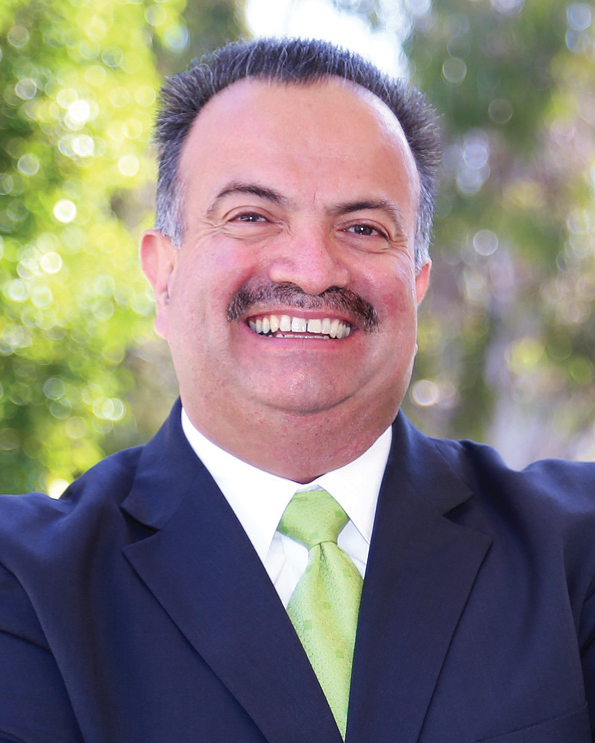Francisco Rodriguez
By Hiedi Andersen
 Francisco Rodriguez says he likes a challenge.
Francisco Rodriguez says he likes a challenge.
With a career spanning more than 30 years in education, the former dean of Woodland Community College was at the helm of the school as it faced one of the biggest hurdles: transitioning the site from being run by Yuba Community College in Marysville, to being a stand-alone, locally-operated facility.
“I couldn’t have told you (then) that I’d be where I am today,” said Rodriguez, who now serves as the chancellor of the Los Angeles Community College District. “(My career) has been a series of unanticipated, unplanned for, and unwanted – in some cases – opportunities. But you listen to why we got into this profession: to help students and communities. And I thought, this is a challenge and I like challenges.”
Rodriguez’ leadership was key as the Woodland Campus of Yuba College transformed into WCC. His role in the college’s transformational years has earned recognition by the WCC Foundation, and Rodriguez will be honored next month as a 2018 Founders Day award recipient.
“I arrived in 1997 as associate dean of instruction and student services,” said Rodriguez, while recently visiting the campus. “In ’99 I became the interim executive dean and shortly thereafter, I became executive dean. I stayed until 2003. I had six wonderful years.”
During those years, WCC was a fledgling. Community members had only recently said they wanted the campus to be separate from Yuba. Budgets needed to be established, and additional staff hired to accommodate the growing student body. Academic approval processes needed to be completed, and numerous visitations from accreditation committees were necessary.
“I was part of the formative years,” Rodriguez said. “The community had an idea. The community really took a bold, foundational stance. They were our external evaluators, our confidants; people who believed in what we were doing. They said they wanted a stand-alone college. I’m proud of what I see here now. This is a 120-acre beauty.”
Staff camaraderie was crucial, and Rodriguez found unique ways to maintain open communication. The close proximity of the buildings allowed regular interactions and discussions. The mailroom, just feet from where Rodriguez’ office was located, served as a true hub of communication.
“We did more business right here, in the mail room,” he recalled. “This is where we argued, debated, arm wrestled. But no one ever debated what the goal was: to build a great college for the Woodland community; to build a service-oriented college for the Woodland community; to build something that this community is, and continues to be, proud of. How we got there was fierce.”
Rodriguez attributes the college’s success to an esprit de corps.
“Because we were a smaller campus, there was an interdependence on each other. Clearly, there are lines of authority, chains of command. But here we were, growing together,” he said. “None of us were too proud to pick up a piece of paper, help a student who was lost get back across the campus. I miss that; that intimate connection. I’m much farther removed now.”
Rodriguez said he gets “a bit nostalgic” when he “peals back some of the beautiful chapter of that time” at WCC.
“I would say this, what I learned here, I carry that with me today. The basic virtues of administration: How you treat and afford people dignity and respect. Try to communicate clearly with others. Try to make sure everyone understands the vision and their part of it. How they can help. It’s building synergy. We’re never going to have enough resources, never. But how do we identify and plan to our strengths, come together and build something greater than the sum of its parts? That’s the magic of administration. That’s the beauty of leadership when done well.”
Many WCC faculty and staff remember Rodriguez fondly. He has been described as “fair”, “a hard worker” and a good friend.
“He didn’t have to agree with you, but, by golly, he’d listen,” said Don Tingley, a fellow 2018 honoree and former administrator who worked with Rodriguez. “He’d act responsibly, intelligently about the things that had to be decided.”
Tingley said Rodriguez was especially thoughtful and respectful toward employees of the college.
“One time, when (Rodriguez) was being interviewed for a position, I think it was the Oceanside position, a headhunter called and asked me questions,” Tingley recalled. “He got to the point where he said, ‘How about switching over to the things that he doesn’t do well?’ I said, ‘I’m sorry, but I’m still working on that question! To this day, throughout my 50-year career, he was – and hopefully still is – the best administrator I ever worked for by any measure that I would apply to an administrator in a school setting.”
Rodriguez’ resume is lengthy — filled with degrees earned, awards presented over his three decades in education, statewide and national association affiliations, and community service contributions. He serves on multiple foundations and committees, and serves as a lecturer in the doctoral education programs at Sacramento State University and at San Diego State University.
Born and raised in San Francisco, Rodriguez attended UC Davis and earned a bachelor’s degree in Chicano studies and his master’s degree in community development. He received his Ph.D. in education from Oregon State University.
Although his professional endeavors have taken him across California, he returns to Yolo County as his base. He and his wife, Irma, maintain a house in Woodland, and he commutes to Los Angeles each week.
“No matter where I’ve been – Sacramento, Oceanside, San Diego — this has been my home.”